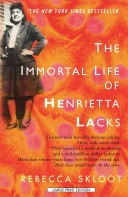I’ve been reading The Immortal Life of Henrietta Lacks for a book club I belong to at work. The book has been a best seller for a while but I’ll admit I was hesitant to read the book at first. My science years are long gone and I dreaded the idea of a snooze fest of boring science read. To be sure, Skloot includes plenty of scientific discovery, but if there is anyone who can make science easy to understand (as in Bill Nye the science guy and Mrs. Frizzle of Magic School Bus fame) it’s Skloot.
Skloot took a convoluted history of working with cells and created a timeline that is easy to read and combined it with the human interest story of cancer patient and cell donator Henrietta Lacks. The human interest portion of the story draws you in and compels you to keep reading. By the end of the book you are a cellular scholar and gain a greater appreciation for scientific discoveries.
What is still troubling, however, is whether or not the Lacks’ descendents are entitled to any financial compensation from the million dollar industry that their mother’s cells helped create. Like someone says in the book, her descendants can’t afford the medical care they need even though their mother helped produce a cure for many of their ailments.
Another troubling point in the story and one Skloot was right not to dwell on was the health problems created by family inbreeding. Henrietta married and produced children with her first cousin, Day. I know this practice has gone on for centuries and I’m not judging it either, I would be interested to know how and why the birth defects happen when close relatives procreate, purely from a scientific view. Oh well, maybe Skloot will write another book about that. If so, I’m on it.
Thanks to Skloot for championing the case of an African American family and depicting, without judgement, their language and lifestyle. It sounds like Skloot and the Lacks have touched each others’ lives.
Bonus points to Skloot for living in Pittsburgh at the same time I was. Woot!
Four paws for scientific discovery and authentic portrayal of African Americans.

